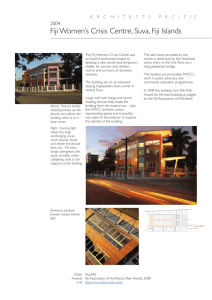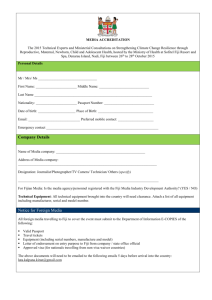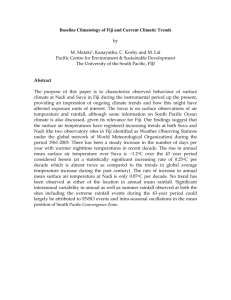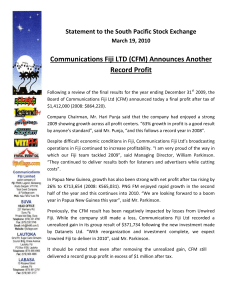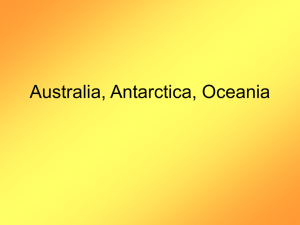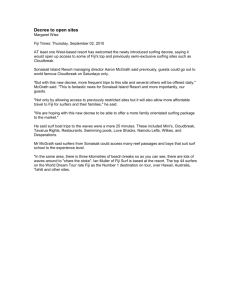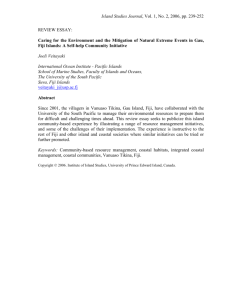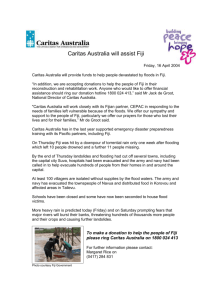October 2011 - Fiji Women's Rights Movement
advertisement
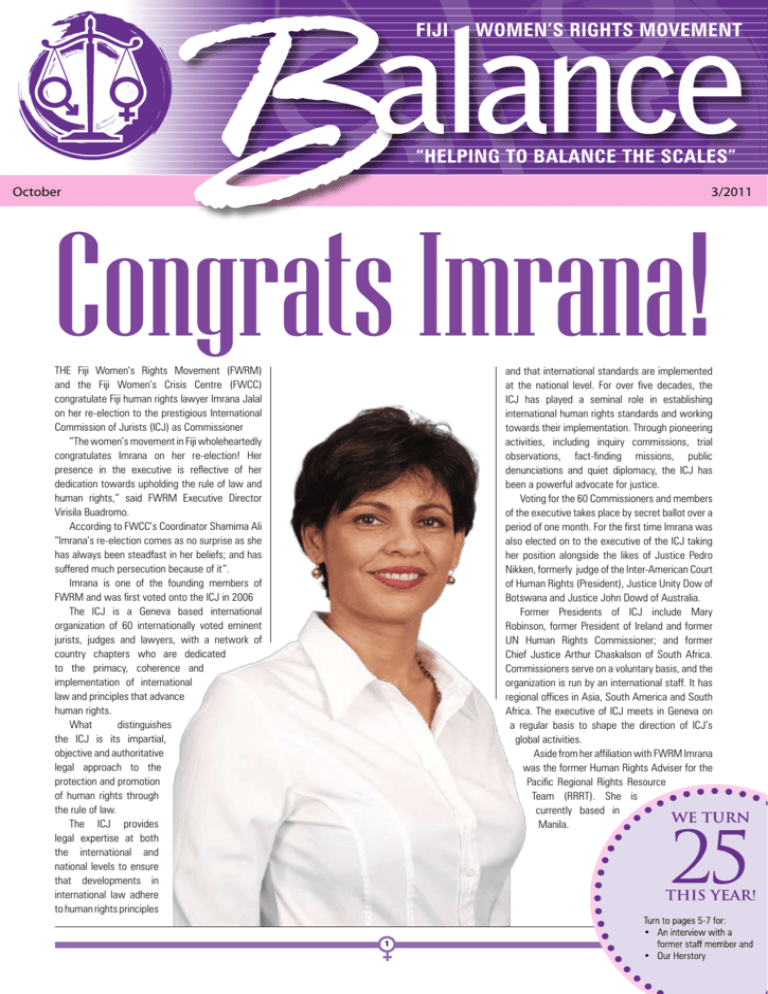
FIJI WOMEN’S RIGHTS MOVEMENT “HELPING TO BALANCE THE SCALES” October 3/2011 Congrats Imrana! The Fiji Women’s Rights Movement (FWRM) and the Fiji Women’s Crisis Centre (FWCC) congratulate Fiji human rights lawyer Imrana Jalal on her re-election to the prestigious International Commission of Jurists (ICJ) as Commissioner “The women’s movement in Fiji wholeheartedly congratulates Imrana on her re-election! Her presence in the executive is reflective of her dedication towards upholding the rule of law and human rights,” said FWRM Executive Director Virisila Buadromo. According to FWCC’s Coordinator Shamima Ali “Imrana’s re-election comes as no surprise as she has always been steadfast in her beliefs; and has suffered much persecution because of it”. Imrana is one of the founding members of FWRM and was first voted onto the ICJ in 2006 The ICJ is a Geneva based international organization of 60 internationally voted eminent jurists, judges and lawyers, with a network of country chapters who are dedicated to the primacy, coherence and implementation of international law and principles that advance human rights. What distinguishes the ICJ is its impartial, objective and authoritative legal approach to the protection and promotion of human rights through the rule of law. The ICJ provides legal expertise at both the international and national levels to ensure that developments in international law adhere to human rights principles and that international standards are implemented at the national level. For over five decades, the ICJ has played a seminal role in establishing international human rights standards and working towards their implementation. Through pioneering activities, including inquiry commissions, trial observations, fact-finding missions, public denunciations and quiet diplomacy, the ICJ has been a powerful advocate for justice. Voting for the 60 Commissioners and members of the executive takes place by secret ballot over a period of one month. For the first time Imrana was also elected on to the executive of the ICJ taking her position alongside the likes of Justice Pedro Nikken, formerly judge of the Inter-American Court of Human Rights (President), Justice Unity Dow of Botswana and Justice John Dowd of Australia. Former Presidents of ICJ include Mary Robinson, former President of Ireland and former UN Human Rights Commissioner; and former Chief Justice Arthur Chaskalson of South Africa. Commissioners serve on a voluntary basis, and the organization is run by an international staff. It has regional offices in Asia, South America and South Africa. The executive of ICJ meets in Geneva on a regular basis to shape the direction of ICJ’s global activities. Aside from her affiliation with FWRM Imrana was the former Human Rights Adviser for the Pacific Regional Rights Resource Team (RRRT). She is currently based in Manila. 1 From the Director’s desk Greetings from FWRM! These last three months has been hard work for FWRM as it was that time of the year again when financial acquitals and reports had to be submitted to our donors and partners. It was also the beginning of a few of our agreements – one of which was the AusAID Infrastructure and Capital Grant. Thanks to AusAID, we were able to replace some of the Movement’s archaic assets such as laptops and printers, as well as boost our server and networking capability. This was a timely grant as many donors these days are not keen on supporting capital expenditure. FWRM has also formed a new partnership with Conciliation Resources, an international non-governmental organization registered in the UK. Through their support, we were able to conduct visits to some of the most remote parts of Fiji. Most of the Movement’s staff was given the opportunity to talk to women in the interior of Vanua Levu, Viti Levu and Taveuni about their challenges, strengths and aspirations! For many of the team members the experience was inspiring, depressing and some even life changing. These visits have also prompted FWRM to revive its legal literacy campaign which kicks starts in November. In this issue, read about FWRM’s representation in Sri Lanka on the Asia Pacific Women’s Watch meeting and research training. The regional training focused on exploring the economic empowerment of women in conflict affected areas – using the UN Security Council Resolution 1325, CEDAW, the Beijing Platform for Action and the Millenium Development Goals. Still on web presence, while we are officially online, please be advised that the website is a work in progress and construction will continue over the next couple of months. We are also on Facebook (www.facebook.com/ FWRM1) and Twitter (@FWRM1) – so do ‘like’ or ‘follow’ us on both social networks. There is a lot more in this issue which I am sure you will enjoy, so please read on and do not hesitate to send your feedback you may have, to info@fwrm.org.fj. Enjoy this edition! In solidarity, Virisila Buadromo Speak out! By Neomai Maravuakula and Shabina Khan The Fiji Women’s Rights Movement spoke to 295 amazing women across Fiji over 11 days. These women were part of ‘speak out’ sessions facilitated by FWRM in rural communities in Vanua Levu, Tavueuni, the Coral Coast, Sigatoka, Nadi, Lautoka, Ba and Rakiraki. FWRM was interested to hear their views on the challenges in their lives, their hopes and fears. From these conversations, FWRM hopes to develop a community outreach strategy on the work that it hopes to do in the next five years. The speak-outs were conducted by three teams involving most of the staff. FWRM believes that this gave all staff the opportunity to hear and see for themselves the impact that their work was having on our rural constituents. “It was quite difficult to listen Walking long distances and to see the hardship that women in rural communities go through every day. Many women continue to walk great distances with their children to ensure they reach school safely. There are those that work together with other women in their community to start a business and earn an income to support their families. Many communities still do not have access to water and electricity” said FWRM’s Finance Officer Ekta Singh. FWRM’s Admin Assistant, Kameli Tikoitoga was also “amazed to see how resilient the women were and how they continued to take care of their families despite the hardships they faced”. The journey to the North (by the first team) was quite an adventure and it was also an opportunity to experience the sights around Fiji which included visiting different places of worship and experiencing the kind hospitality the ‘friendly North’ is famous for. Aside from meeting the women, some of the highlights of the trip included – driving up and down many long, dusty and very bumpy roads; squeezing nine women (and children from the villages) into a six-seater vehicle, and the obligatory kava sessions. And of course no adventure would be quite complete without a car break-down (on the very lonely and muddy Delai Na Bure Hill in the district of Solevu, Bua!) and a flat-tire. It was a trip that broke many stereotypical notions, with a lot of people surprised to see three young women making the long road trip to remote communities in Macuata, Cakaudrove and Bua. FWRM visited 15 communities, in the western division. Despite geographical differences, the stories shared by women in these communities were similar to the ones shared by women in the Northern Division. They all face the same issues and challenges. One hundred per cent of the 295 women visited were unaware of the Family Law Act. In addition, the scoping visits found that these women are eager to learn about laws - particularly how they can assert and claim their rights. All of the women interviewed were unaware of FWRM or the work that we do. This clearly shows that media censorship and the need to seek permits for any community work, has limited the kind of information that communities are receiving It also clearly showed that FWRM needed to raise its public profile and the question raised was “ How are we going to do this?” One of the answers came from the women themselves when they all requested for FWRM to come to their communities and conduct a legal literacy using interactive methodologies and in their vernacular. We have taken heed and in November this year, FWRM in collaboration with Pacific Regional Rights Resource Team (RRRT), will be piloting the first of its legal literacy training in Labasa. 2 Human Rights The 42 Pacific Island Forum Leaders’ Meeting was held in Auckland, New Zealand from September 6-9 amidst an air of excitement, speculation and rippling energy, though mainly because of the 2011 World Rugby Cup. Fiji Women’s Rights Movement (FWRM) was involved with designing, planning and implementing a side event during the forum leaders meeting. This was carried out jointly with Women’s Rights and Advocacy in the Pacific (WRAP) based in Wellington, New Zealand and was supported by OXFAM NZ. After many email exchanges and Skype conversations, the event was delivered with a huge success. FWRM/WRAP was immensely pleased with the turnout for the event with around 60 people in attendance – from past and current politicians, to feminists, activists, human rights defenders, donors and other CSOs from the region. The objective of the panel was to discuss some of the ways in which women’s political and public participation can be enhanced in the region. Women constitute around 50 percent of the world’s population and their full and equal participation will reflect the composition of society. Women’s participation also enhances the legitimacy of political/public processes by making them more democratic and responsive to the perspectives of all segments of society. Also through the different experiences, insights, approaches and points of view, women can contribute to broadening political debates by redefining political priorities and providing new perspectives on political issues. This would include providing gender perspectives, addressing children’s rights, gender based violence and other inequity issues The panel covered a broad and general range of The Drodrolagi Movement (droMo) celebrated its first birthday last month with an afternoon tea with members, allies and friends at the Citizens’ Constitutional Forum’s Outdoor Space in Suva, Fiji. droMo is a social, support and educational network of lesbian, gay, bisexual, transgender, intersex (LGBTI) students at the University of the South Pacific, Laucala Campus, Fiji and their allies and friends. Reflecting on the first twelve months, droMo President Kris Prasad said it had been a challenging yet positive year for the group. “It has not been easy with the homophobic intimidation, emotional bullying and opposition that we have faced but we are thriving thanks to the dedication and courage of droMo members and support from allies such as the NGO Coalition on Human Rights (NGOCHR), Youth Coalition Fiji and wider civil society and community in Fiji and abroad.” NGOCHR Chair and Fiji Women’s Crisis Centre Coordinator Shamima Ali Image courtesy of Oxfam New Zealand Women, Change, Politics By Roshika Deo topics to serve as a stimulus and introduction to a more detailed discussion that eventuated successfully. Within the context of the Pacific, the topics covered by the panel were Temporary Special Measures, Gender Responsive National Budgets, Women’s Leadership, and State Obligation and Accountabilities. Strategic activisms were also discussed. The panel was designed to allow for ideas/ information to be shared, questions to be discussed and the building of solidarity/networking among the group. Sarah Meads from Oxfam/WRAP introduced the four panelists. FWRM’s Roshika Deo started the panel presentation by setting the regional context with respect to women’s political/public participation. She then introduced gender responsive budgets and shared some advantages. The session ended with a By Kris Prasad congratulated droMo on this milestone. “The NGO Coalition on Human Rights is proud to have the Drodrolagi Movement as a member and urges everyone to promote, protect and respect 3 brief discussion on our Pacific leaders’ obligations and accountability under regional and international policies and laws. Helen Hakena from the Leitana Nehan Women’s Development Agency Buka in PNG shared the challenges faced by women and some of the advocacy they had undertaken around lobbying for reserved women’s seats. Next Jocelyn Lai from YWCA, Solomon Islands spoke about the YWCA strategy on young women’s leadership in public and political spaces. The panel presentation ended with Siava Tekafa from the Tuvalu National Women’s Council who presented on the work being carried out by their national body on women’s political and public participation in Tuvalu. She also identified cultural and social barriers faced by the Tuvaluan women. FWRM hopes to continue building on the work of enhancing women’s public and political participation. the human rights of all people regardless of who they are. droMo must be commended for its perseverance and for putting LGBTI rights on everyone’s agenda.” Fiji Women’s Rights Movement’s Executive Director Virisila Buadromo also praised droMo for the fantastic work it has done in just under a year. “Congratulations to droMo for standing firm in the face of adversity. We wish the Movement well for the coming year and look forward to working with them on issues related to human rights.” According to Kris “the way ahead for droMo is challenging and exciting”. “We look forward to building our strong youth and community movement and working on social justice and human rights for those with diverse sex, sexual orientation and gender identity,” he added. *Drodrolagi is the Fijian word for ‘rainbow’. Opinion The idea that is beauty There has been vibrant discourse on beauty pageants in Fiji on different forums over the last few months. I for one found these discussions enlightening as it forced me to dwell on certain aspects of pageants. After many discussions I do acknowledge that the local (Suva-based) Hibiscus Festival does provide a platform for young women to gain confidence and to network. However, it makes me question why do we not have other empowering platforms for women to have a voice, gain confidence and network? It also forced me ask – we have had beauty pageants for so many years, if it is really empowering and builds confidence, then why are women still marginalised, discriminated and underrepresented? I agree and respect that it is a choice to enter beauty pageants but I am also aware that liberation and objectification are not one and the same thing. We live in a society where ‘what it is to be a woman’ is constantly marketed. There is a standardisation of women and their beauty and sexuality. And this context frames our everyday choices. Beauty pageants are not harmless entertainment nor genuine empowerment - the Pacific region has the worst rate of violence against women with two in every three women experiencing violence, and the region may very well fare the worst in the world in terms of women in parliament and at national decision making; despite women making half, if not more of the regional population. There is no denying that gender inequalities are the main cause of violence against women and also for the lack of public and political participation by women. Beauty pageants reinforce gender inequalities - in an active and explicit manner by supporting prejudicial societal norms of viewing and perceiving women. And this affects all women (yes, even the ones not taking part). Beauty pageants encourage women to be treated as objects to be paraded - teaching contestants how to walk (did we not learn this as a one-year-old?), how to be “lady like” (generalisation of women and standardisation of their individual unique beauties – and what if women wanted to wear pants or a business suit?), how to put on make-up and to do your hair. As such, beauty pageants have effectively contributed to a culture where women are expected and treated as objects of aesthetic value. Why can we not have pageants where women get professional training on public speaking and By Roshika Deo then participate in a public judged debate on thematic issues affecting people? Why can we not have mock parliament competitions? Why can we not provide forums for women and men to engage together and dialogue for moving to a better standard of living for everyone? Why can corporate sponsors not give money for scholarship to these women to study regionally or overseas, instead of for makeup, clothes and hairstyles? When will we focus and encourage women’s intellect and real empowerment – that is, attaining tertiary/technical qualifications, building a career and becoming financially stable? When will we bridge gender inequality and challenge stereotypes to progress towards eliminating violence against all women and enhancing women’s political and public participation? We need to find ways and opportunities for women to be empowered, to network and to gain confidence - where their intelligence is used and developed, where they embrace their individuality and uniqueness, and where all women’s human rights are realised. We should also reflect on the kind of leadership, culture and role models we are creating for girls and women to aspire too. Are we going to continue telling women that their empowerment and confidence rests on a standardised expectation of beauty? There has been a vast increase in the number of children’s beauty contents locally and around the world. Is this the next generation we have unconsciously created and are continuing to do so? During recent protests to ban beauty pageants with children and teenagers, Phillip Brock, the chair of the Royal Australian and New Zealand College of Psychiatrists stated that: “We’re giving these kids messages that how they appear, how they perform and standards about what 4 4 they’re to come up to is actually more important than what they’re like inside. Direct participation and competition for a beauty prize conveys messages relating to the desirable self, social and personal value and shapes emotional and psychological development. Infants and girls are objectified and judged against sexualised ideals. The mental health and development consequences of this are significant and impact on identity, selfesteem and body perception”. Physically challenged women, women with hearing and speaking challenges and visually impaired women cannot take part in this mainstream beauty contests. We are effectively discriminating against these women by not providing them with an enabling environment to participate - so empowerment for some and not for all? Beauty pageants do not genuinely empower all women if we continue to be looked upon as objects and judged by the audience and judges on who looks better or is more akin to a standardised expectation of female beauty and of being a woman. Being judged on a platform competing with other women is not going to make a difference to the subjugated power relations women have in society. These subjugated power relations makes us susceptible to gender based violence and denies us our human rights. So let’s think about this deeply and seriously. Let’s think about the present and the future. Let’s think about the impact of our actions and decisions on girls and other women and society as a whole. Silver Jubilee To mark FWRM’s 25th anniversary, we have been speaking to some amazing women who have contributed to the Movement’s work in realising women’s human rights in Fiji. One such woman is Praveen Sharma who worked at FWRM from 1994 to 1997. She shared with Balance her experience with the women’s movement. Where is she now? When did you join FWRM? I joined FWRM in April 1994 as the Project Officer for the Women, Employment and Economic Rights (WEER) project. I was presented the opportunity to be the Acting Coordinator when Vani Dulaki joined the Regional Human Rights Resource Team (RRRT). I was in that role until 1997 when I joined the United National Population Fund (UNFPA). How did you come to work for women’s human rights based organisation such as FWRM? My parents were strong feminist influences in my life. I was brought up to believe that I could achieve anything, as long as I applied myself. My feminist ideology was further strengthened when I went to Australia and undertook undergraduate studies in political science. I was also a member of the Young Labour Movement which further reinforced my human rights values. I was fortunate that when I returned to Fiji upon completing my studies, FWRM was recruiting for the WEER project and I was successful. How long did you work at FWRM for? I was with FWRM for nearly three years as a staff member and then joined the Management Committee and was a member of the Management Committee and the Collective until late 2000. What were some of the activities/projects that you worked on? The main initiative at the time was the WEER project; FWRM’s submission to the constitutional reforms, the Sexual Assault Bill, the Family Law Reform Project. We also published “Labouring Under the Law” by “Atu Emberson-Bain. What were some of FWRM’s major achievements during your time there? • Changes to employment guidelines – we got sexual harassment in the workplace recognised – I still recall the presentation to the Fiji Employers Federation – it was the first time FWRM had been invited by this organisation and it reinforced our credibility as an organisation for the rights of women workers. • Our submission to the Constitution Review Commission Praveen with daughter Anika and son Sebastian • The Sexual Assault Bill • The Family Law Project • We also secured ongoing funding from OXFAM New Zealand for the WEER project • The inaugural Human Rights Awards What were some of FWRM’s major challenges during your time there? Ongoing funding was the main challenge. We spent a lot of time writing project proposals as part of our quest to secure ongoing funding. We were a young team, and I remain indebted to the commitment of the women and men within FWRM - strong feminists such as Imrana Jalal, Helen Sutherland, Claire Slatter, Mridula Prasad, Atu Emberson-Bain and Ratu Joni Madraiwiwi who spent time mentoring and training us; reviewing our proposals and advocacy materials; networking to secure ongoing resources for FWRM; and being our support base when the challenges seemed overwhelming. Where do you work now? I work at the NSW Department of Health, based in Sydney, Australia. My focus is on clinical education policy and workforce planning to ensure that New South Wales (NSW) trains health workers with the necessary skills to meet the 5 health needs of its population. FWRM has been a key influence in my career choice in health – as the seed for working on health issues was initially planted at FWRM. How to you feel on FWMR turning 25? The last twenty five years is testament to the dedication and hard work of all who have been involved in FWRM. The organisation has continued to grow and evolve to meet the changing needs of women in Fiji. My only regret is that Fiji’s political issues have restricted some of the legislative advances that FWRM has been advocating for. However, I am inspired by the continued resolve of women in Fiji and their commitment. It is also heartening to see the passion for women’s rights being upheld by a younger generation of ardent feminists. FWRM is well placed to meet the challenges of the next 25 years – BRING IT ON! It has been a privilege to be part of FWRM. FWRM has been key to developing me as a person, as a woman, and as a mother. I joined straight out of University – ready to change the world and FWRM provided me with an avenue to make a difference! I have many fond memories from FWRM and am honoured to count a number of women from my days at FWRM as friends and mentors. Thank you FWRM! Celebrating 25 y The Fiji Women’s Rights Movement, formed in 1986, is a multiethnic and multicultural non-governmental organisation committed to removing discrimination against women through institutional reforms and additional changes. By means of core programmes, as well as innovative approaches, the FWRM practice promotes democracy, good governance, feminism and human rights. It strives to empower, unite and provide leadership opportunities for women in Fiji, especially for emerging young leaders. Over the last 25 years the Movement has had many triumphs and an equal share of challenges. Despite this, FWRM continues to INSIST PERSIST RESIST EXIST in the face of adversity and remains optimistic for the future of women’s human rights in Fiji. Over the years FWRM has maintained its founding principles of democracy, good governance, feminism and human rights; more so during Fiji’s numerous coup d’états. Be it the 1987, 2000 or the 2006 political upheaval, FWRM was one of the very few ogranisations in Fiji, overtly calling for the return to democratic rule. The Movement along with other NGO’s also successfully lobbied the removal of discriminatory citizenship provisions in the 1997 Constitution. Young Women in Leadership Reflections of long standing member: Diane Goodwillie The Movement had been working closely with young women in secondary schools and in the workforce under its Women’s Employment & Economic Rights project. In 1998, it launched a campaign around two themes: Girls Can Do Anything and Jobs Have No Gender. The response and interest of the young women in these campaigns was overwhelming. It resulted in the Emerging Leaders Forum (ELF) programme such as you see it today. ELF began in 2004 and is a year-long leadership programme developed and run by FWRM. It is designed for young women who come from varied socio-economic, ethic, religious and educational backgrounds. It is now a global best practice project, adopted by many NGOs. To date 79 young women (working in different fields from diverse backgrounds) have joined the ELF Alumni. These young women leaders have been involved in many of FWRM’s advocacy activities, including International Women’s Day celebrations, the 16 Day of Activism against Gender-based Violence and International Human Rights Day, here at home. Internationally, Alumni mem-bers have represented Fiji at large human rights, youth and women’s rights conferences and events. These passionate young women continue to air their views on critical issues through the use of media, training and awareness raising campaigns. 6 Ruth Lechte and my involvement in FWRM started as long distance supporters and arbitrators; when strong women debate, a fragile organisation can result and more than once we travelled from Nadi to Suva to calm and consolidate new directions. The most memorable evening was an in-house training workshop held at in Feb 2000 at the Raintree Lodge. About 50 women talked about the influential women in their lives - a film crew captured this but we didn’t capture the film crew so it was lost to memory. Afterwards young women like Patrina Dumaru were in stitches hearing personal stories from Imrana Jalal and Atu Bain. The result of that training was the recommendation to establish an Emerging Young Leaders Program [Forum]…in going through old files I came up with a historic document dated 18/08/2000. It’s a Fiji Military Forces Curfew Pass allowing me to travel from Suva Point to Tamavua after 10 pm from the 18th to the 20th of August. The 2000 coup had happened just when we’d planned a young women’s meeting; so the venue was changed from the Raintree Lodge to the USP Suva campus and we had two days of wonderful speakers on everything from God to jobs for girls. I’m more than pleased to be an ongoing part of Fiji Women’s Rights Movement. Let’s hope the need for women’s rights improves but that the movement continues. years of Herstory Legislative Reform and International Lobbying 1986 – To date Draft Sexual Offences Legislation: women in the rural and urban areas complained that the laws related to sexual offences were outdated. Despite requests by the NGOs to change the rape laws, it went unheeded by Government till before the coup of 2006 when it went under review. The Crimes Decree (2009) has broadened the definition of the offence of rape and while FWRM believes that the Decree contains some improvements from the Penal Code, it has failed to update the language to incorporate a human rights based approach. 1993-1995 Lobby for the UN Convention on the Elimination of all Forms of Discrimination against Women (CEDAW): this makes governments committed to programmes for women’s equality. The Government of the day insisted on being shown that all women wanted this law. Unprecedented meetings, petitions and lobbying finally led to Fiji ratifying CEDAW in 1995. 1993-2003 Family Law Campaign (active during three different governments): the legislation, common law and legal practices were discriminatory against women. The proposed law had many ups and downs and was defeated many times by military interruptions to the rule of law, or ideological opposition. It finally became law in October 2003 and was activated in late 2005. 1994-2007 Employment Relations Bill Campaign: reforming outdated and sexist labour legislation. Maternity protection, equal employment opportunities, equal pay for work of equal value and penalizing sexual harassment in the work place was incorporated into the ERB 2006 and was in its last reading in December 2006. FWRM critiqued and made public their concerns about protection of women and human rights in the ERB. In 2007 the Employment Relations Promulgation came into effect. While women’s organisations had long pushed for this change it believes that legal 7 reform should go through a democratically elected government. 2005 Anti-Promotion of Reconciliation, Tolerance and Unity (PRTU) Bill Campaign: FWRM believed that the Bill was unconstitutional and illegal. FWRM and Fiji Women’s Crisis Centre (FWCC) with the NGO Coalition on Human Rights lobbied and protested against the SDL-introduced PRTU Bill. Three FWRM members were arrested over the anti-Bill peaceful protest and two march permits were denied. 2002 and 2010 Report to CEDAW Committee: FWRM spearheaded the NGO Shadow Report twice to the Committee. 2010 United Nations Universal Periodic Review (UPR): FWRM made a submission to the UPR on Fiji (which was endorsed by the FWCC and the Citizens’ Constitutional Forum. Environmental Rights Remembering Dr. Wangari Maathai: “We Must Persist” By Emily Musil Church Maathai’s leadership in the global environmental movement was always coupled by commitments to peace and to women’s empowerment, issues she saw as inseparable from ecological sustainability. In an article last December, Maathai challenged the international community to extend land and political rights to women, saying: “If the international community is serious about addressing climate change, it must recognise women as a fundamental part of the climate solution.” Image courtesy of Green “I already see her true legacy: ordinary men and women in rural communities around the world, from Cambodia to Brazil, who take her as their inspiration when standing up against the logging companies, exposing collusion and corruption by the authorities, and protecting their forest heritage for future generations.” Belt Movement website Fearless human rights and anti-poverty crusader. Visionary environmental leader. Global women’s rights activist. Advocate for democracy. More than one phrase is required to begin to sum up the contributions the late Dr. Wangari Maathai made to the global community through her tireless work for a more just and sustainable world. Born in Nyeri, Kenya in 1940, Maathai demonstrated a fierce intellect and leadership ability from her youth on. She was the first woman in east or central Africa to receive a doctoral degree (in 1966), the first to become a tenured professor (in 1976), the first to chair a department (in 1977), and the first woman in all of Africa to receive the Nobel Peace Prize (in 2004). Maathai pioneered a new, grassroots form of global environmentalism when she founded the Green Belt Movement in 1977 to harness the power of rural Kenyan women to address the challenges of deforestation, soil erosion and lack of water in Kenya by planting trees and to provide Kenyan women and girls with firewood for cooking and access to clean water. The movement has planted 40 million trees across Africa; but its influence has been even broader. Kenyan journalist Joseph Kabiru writes: Dr. Wangari Maathai Upon news of Maathai’s death on Sunday at age 71, President Ellen Johnson Sirleaf of Liberia said: “Africa, particularly African women, have lost a champion, a leader, an activist. We’re going to miss her. We’re going to miss the work she’s been doing all these years on the environment, working for women’s rights and women’s participation.” In recent years, Maathai has received a number of honors for her work, including the 2004 Nobel Peace Prize. In 2005, Maathai was honored by Time magazine as one of the 100 Most Influential People in the world and by Forbes magazine as one of the 100 Most Influential Women in the world. In 2006, she was given the Feminist 8 Majority Foundation’s Global Women’s Rights Award. However, her fearless activism has come at a price. Maathai has been harassed, beaten unconscious, humiliated and jailed. Yet she has never faltered in her commitment. Maathai was ever mindful of future generations. In her 2004 Nobel Peace Prize acceptance speech, she said that she hoped her winning would “encourage [women and girls] to raise their voices and take more space for leadership.” May we honor the courage, vision, and legacy of Wangari Maathai. In her words, “We must not tire, we must not give up, we must persist.” Excerpted Ms. Magazine September 27 2011) blog (published ELFA Alumni Retreat Excitement in the air, the Emerging Leaders Forum Alumni (ELFA) were eager to hop onto the bus and start the much anticipated planning retreat down to Pacific Harbour. After a lot of ohhhs and ahhss, hugging and hellos, we finally settled in the bus and made our way to Tsulu Backpackers. The ride was drowned by music and chatter of the ELFA. Soon after arriving at Tsulu, we scurried to our dorm, chose our rooms, dumped our bags and went to the dining area where a scrumptious BBQ meal awaited us. Early the next morning, 25 sleepy eyed, dishevelled young people, headed for the dining area for a light healthy breakfast. This seemed to ‘awaken’ us as the area was soon filled with laughter and discussions. After breakfast, we freshened up and awaited our facilitator for the day, Sandra Bernklau, to arrive. Her arrival saw us ushered into one of Tsulu’s conference rooms where we to be based for the day. Most of us expected the session to be monotonous and maybe unproductive but come the end of the day, we realised how WRONG WE WERE! The session started with the girls being divided into teams of two and each was given a few minutes to get to know their partner then introduce her to the whole group. Since we had all come from different ELF groups, this exercise was much needed as the girls got to mix with another By Mamta Chand and Beatrice Mar ELF sister from a different year. Each group activity required us to move to a working group which we previously were not a part of in the last activity. Come the end of the day, we were all mingling and laughing as if we had all been in the same year. There was now no segregation of ELFA sisters (as it was on the first night). The sessions that day also saw ELFA establish its values and objectives as Alumni; discuss future activities; set a structure in place and form a secretariat. We had so much fun at the workshop, most of us did not realise that the day had quickly come to an end; it was surprising to note that although we had a lot of fun, we had also accomplished so much. After dinner that night, most of the girls decided to have an informal bonding session at Uprising Beach Resort. Out came the dresses, leggings and fancy tops, makeup kits, perfume and we all got ‘dolled’ up. Everyone gathered in the common room and we all trooped down for a night of dancing and fun. A team building session was scheduled at Uprising Beach Resort, the next day. We arrived there and were soon split into two teams. From Bonding activities 9 ELFA Objectives speedy potato peeling, filling a bucket with seawater, sack racing to ‘dog and the bone’, we all had a hilarious time. It was a wonderful time for empowering each other and discovering “the other” side of one another. Lunch was exceptionally scrumptious and as usual we all filled ourselves till we could no more. Economic Rights Joining the Dots with APWW By Shabina Khan Twelve women from nine countries in the Asia Pacific region gathered in Colombo, Sri Lanka to share their experiences of living and working in conflict affected settings. This was to feed into a research project which explores practical ways to integrate the links between four human rights instruments and economic empowerment programs for women. The project was a partnership between a regional network, Asia Pacific Women’s Watch, Australian NGO Justice Equality Rights Access and Sri Lankan NGO, Women’s Media Collective. The participants were in Colombo in August to develop some initial thinking on how the Millennium Development Goals (MDG) can work better for women by using the frameworks from the United Nations Security Council Resolution 1325 (UN1325), the reporting from, the Convention on the Elimination of all Forms of Discrimination against Women (CEDAW) and integrating strategies from the Beijing Platform for Action (BFPA). I represented the Fiji Women’s Rights Movement at the meeting. The other participants’ and I discussed methods of case study compilation and were trained on how to better utilize CEDAW and the MDGs during the research. An interesting discussion in the training centered By Shazia Usman The Fiji Women’s Rights Movement will be attending the Association for Women’s Rights in Development’s (AWID) International Forum next year. Transforming Economic Power to Advance Women’s Rights and Justice, the 12th AWID International Forum, will gather up to 2000 women’s rights leaders and activists from around the world from April 19 to 22, 2012 at the Halic Congress Center in Istanbul, Turkey. The AWID Forum aims to explore how economic power is impacting on women and the planet, and to facilitate connections among the very diverse groups working on these issues from both human rights and justice approaches so that together we contribute to stronger, more effective strategies to advance women’s rights and justice. Out of the over 800 proposals AWID received to host a session at the forum next year, only 100 were chosen – this includes two proposals from FWRM! In line with the theme, FWRM will host a session on “Implementation of ‘gender responsive laws’ - who decides allocation of resources?” Panelists for the session will be from Fiji, Cook Islands and a representative from Micronesia. The session will discuss some of the experiences from small island states in the Pacific. on how the human rights instruments have played a key role in assisting governments and other stakeholders in many countries to achieve gender equality. However despite this work, much remains to be done. Studies show that the Asia Pacific region contains 60% of the world’s women. The region is also characterized by a combination of natural disasters and civil and political unrest. According to the United Nations, almost half of the armed intrastate conflicts in the world today are fought in the Asia Pacific region. Based on this context, FWRM’s Shabina Khan making a point at the meeting FWRM is in the process of compiling a number of case to develop better gender and transitional justice studies that will assist in a conflict analysis that uses strategies. The research findings will be presented the frameworks of UN1325, CEDAW, MDG and BFPA. the 2012 Commission on the Status of Women and FWRM is using this opportunity to ensure that the Fiji the Association for Women’s Rights in Development experience is included in the international discourse. Forums in Istanbul, Turkey next year. For the organisation this will be useful analysis needed AWID 2012 The session objectives are: • To discuss how Family Law legislation are implemented in countries and how much resources are allocated for the implementation. • To generate discussions on who decides what resources will be used on the implementation of Family Law legislation. 10 • To discuss what are the roles of international monetary institutions in influencing funding allocation for implementation of legislation. In addition to also ascertain what percentage States’ set aside to for Family Law legislation. • To discuss and share experiences of what factors may hinder the implementation of Family Law legislation. FWRM will also collaborate with AWID; the Asian Network of Women’s Funds and the Centre for Gender Studies and Advocacy (Ghana) to host a combined session on “Trends Affecting Women’s and Rights Funding: Global and Regional Perspectives.” This session will bring together donors, women’s and rights activists and feminist researches to debate and strategize around the state of women’s rights funding in specific regions and globally. It will draw on research findings and experiences and challenges with mobilizing resources for women’s and girl’s organising. Through a lively and dynamic discussion, five panelists will be sharing research findings around similar research on “Where is the Money for Women’s Rights” in different contexts and regions and their practical experience around challenges for assuring funding for women’s rights organising and for securing unrestricted funds for women’s rights work. REVIEW Middlesex Desert Flower Excerpted from www.curledup.com on September 21 2011 Excerpted www.hiiraan.com on September 22 2011 Author : Jeffrey Eugenides Year : 2007 The genius of Jeffrey Eugenides’s Pulitzer Prize-winning novel Middlesex isn’t in its seamless melding of three generational story strands into a captivating whole. It isn’t in his precise use of language to evoke feelings of poignancy and amusement, often in the same sentence. It isn’t even that Middlesex is the rare novel set in Detroit that captures that city’s danger and sad beauty at the same time. The genius of Middlesex is that it takes a main character who is something other than “normal” and makes that character achingly, recognizably human. The narrator and protagonist of Middlesex is Cal, a hermaphrodite1 raised as girl who later finds something resembling happiness as a man. Born Calliope Helen Stephanides into a Greek-American family, “Callie”, as he is first known, seems like a girl to everyone – parents, his half-blind, old-fashioned doctor and even the other kids at school. But as Callie gets older, his voyage into puberty diverges sharply from the other girls he knows, and he begins to suspect, subconsciously at first, that something is different about him. Those suspicions are confirmed when he develops a powerful attraction to a female classmate, whom he refers to only as the “Obscure Object.” The relationship eventually leads Cal to discover his true identity, and sets him on a whole new path. That is more or less the book’s plot, but the thing that makes Middlesex special is that, like most life stories, Cal’s does not exist in a vacuum. To explain his present, Cal delves deeply into his past, which includes his incestuous grandparents’ emigration to Detroit from Turkey, his parents’ troubled love affair, a predictably rebellious brother dubbed “Chapter Eleven,” and the troubled, racially conflicted city of Detroit. Detroit is almost a character in the book – the city’s race riots are memorably depicted, as is Cal’s grandmother’s stint as a silk-worker for a charismatic Nation of Islam leader (who turns out to be a figure from the family’s past). Cal’s inner struggle is compelling, but so are the troubles of those around him. It’s a wonderful story full of colorful, involving characters, and Eugenides deserves all the accolades he’s gotten if only for his gift of taking characters (hermaphrodites, immigrants, racial and ethnic minorities) that society treats as somehow “other” and getting us to see ourselves in them. Identity is something everyone struggles with. Middlesex lets us know that we are not alone. 1Every year in the U.S., approximately 1 in every 2,000 babies are born with an intersex condition, which makes intersex more common than Cystic Fibrosis. Intersex conditions include Congenital Adrenal Hyperplasia, Klinefelter’s Syndrome, Androgen Insensitivity Syndrome, MRKH, and Gonadal Dysgenesis, among others. More and more people - including parents and doctors - are learning that our intersex bodies are just one of the many ways that human bodies vary. Intersex is not a disease or disorder (source: www. oiiaustralia.com). Review by Karen Benardello Chronicling a person’s life story on screen is never an easy task, especially when the person is from a different culture than the intended audience. Sherry Hormann is one such screenwriterdirector, as she had the difficult task of adapting African nomad-turned-supermodel Waris Dirie’s autobiography Desert Flower. Instead of going the easy route and focusing on the success Waris found later in life as a model, Hormann made the risky decision to focus on Waris’ fight to end the Female Genital Mutilation (FGM) she wrongfully had to endure. Desert Flower follows the life of Waris (portrayed by Ethiopian model and actress Liya Kebede) as she overcomes the struggles of poverty and FGM she faces in her native country of Somalia. Through flashbacks, Hormann chronicles Waris’ life after she escapes an arranged marriage to a man old enough to be her grandfather when she was 13-years-old. She is sent to London by her grandmother to work as a maidservant for a representative at the Somali embassy. When the Somali regime is later overthrow, Waris decides to live on the streets of London than to return to her family. Throughout Desert Flower, Hormann primarily details the start and rise of Waris’ modeling career in London. While working as a cleaning woman in a fast food restaurant, Waris is discovered by a fashion photographer, Donaldson (played by Timothy Spall), who thinks she would be a successful print and runway model. Waris is encouraged to pursue a modeling career by her roommate and friend Marilyn (portrayed by Sally Hawkins). After revealing her experience with FGM to Marilyn, and becoming more comfortable in front of the camera and on the runway, Waris takes her story to the media. She’s eventually named a UN special Ambassador for Women’s Rights in Africa. Hormann and producer Peter Herrmann made the right decision to hire Kebede to portray Waris. While Kebede previously only had small roles in The Good Shepherd and Lord of War, she was the perfect choice to play the nomad-turned-model/philanthropist. Since both women were born in Africa and fought to overcome their circumstances to not only become models but to speak on the behalf of women, Kebede naturally understood Waris’ determination. As Hermann has said, “A successful screen adaptation of a life story depends far more on the actor playing the protagonist than in any other kind of film. Our Waris was in…practically every scene, so our actress had to be someone who could carry the film.” During the casting process, Hormann and Herrmann were both instantly attracted to Kebede, not only for her physical resemble to Waris, but for her radiance and natural understanding to the story as well. ‘Desert Flower’ is also an excellent adaptation of Waris’ 1998 autobiography of the same name, which has sold over 11 million copies worldwide, because Hormann was perfectly able to translate the book’s powerful message to the screen. Waris proved that no matter how dire a person’s circumstances are, if they are dedicated to improving themselves, they will succeed. Herrmann has also said that “‘Desert Flower’ is a deeply moving and dramatic life story that raises concern and aims to create change.” The audience will no doubt be rooting for Waris to not only thrive in her modeling career to make a better life for herself, but to also bring an end to FGM with the help of the UN. 11 About us The Fiji Women’s Rights Movement is a multi-ethnic and multi-cultural nongovernmental organisation committed to removing discrimination against women through institutional reforms and attitudinal changes. By means of core programmes and innovative approaches, FWRM practices and promotes feminism, democracy, good governance and human rights. We strive to empower, unite and provide leadership opportunities for women in Fiji, especially for emerging young leaders in Fiji, indigenous and locally-born women. The FWRM vision is for the women of Fiji to be free from all forms of discrimination, have equal access to opportunities and to live in a healthy environment where the principles of feminism, democracy, good governance, multiculturalism and human rights prevail. Join us LOOKOUT! Vacancy: Programme Manager The Fiji Women’s Rights Movement is looking for a dynamic person to undertake the role of Programme Manager. The successful candidate will work closely with the Executive Director; taking the lead role in the Movement’s programme planning and implementation; its staff and volunteer training and orientation. She/he is expected to maintain a high level of awareness of current issues and legislation affecting women, encourage the emergence of young women leaders and work closely with the programme staff and volunteers to ensure creative and effective FWRM programme operations. APPLICATION OPEN ONLY TO FIJI CITIZENS YES! I want to support the Fiji Women’s Rights Movement Visit our website for application details: http://www.fwrm.org.fj/ ANNUAL FEE: Legal Literacy Workshops Waged - $10 • Organisation - $30 Non-waged/Student - $5 Name: Address: Ph: Email: FWRM will hold Legal Literary Workshops for women in the rural communities in the Northern and Western Divisions. These workshops will begin in November. For more information email info@fwrm.org.fj 16 Days of Activism Against Gender Violence We are planning to produce a series of videos on “What Does Security Mean to You?” to commemorate the 16 Days of Activism Against Gender Violence (November 25 – December 10). The 16 Days Activism has been used as an organising strategy by individuals and groups around the world to call for the elimination of all forms of violence against women. Fiji Women’s Rights Movement Ph: (679) 3313156 Fax: 331 3466 website: www.fwrm.org.fj Email: info@fwrm.org.fj Mail: GPO Box 14194, Suva, Fiji Is If you would like to get involved or would like to know more about it, email info@fwrm.org.fj 12
